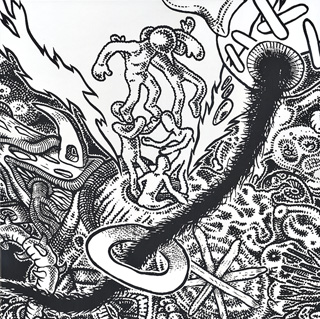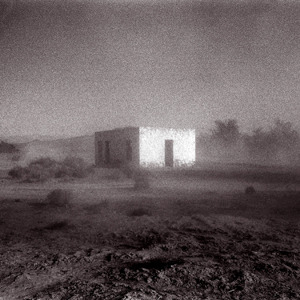
Features | Lists
By The Staff

20 :: Scott Walker
Bish Bosch
(4AD)
Like a Michael-Gira-or-that-guy-from-Naked-meets-Freddie-Kruger’s Nightmare version of an R. Kelly video project, so is Bish Bosch. Also with fart sounds. And “Jingle Bells.”
So, this one time my roommate came in while I was Netflix-bingeing, watched a few seconds’ worth of Twin Peaks and proclaimed: “It looks cool except for the bad acting and the ’80s-ness.” Bish Bosch carries a similar aesthetic negotiation—it’s deliberate, and it is brilliant, but it’s also a deliberately, brilliantly, aggressively excruciating listening experience. In Twin Peaks’ pilot episode, there’s a scene where Laura Palmer’s two former lovers are thrown in adjacent prison cells. And in an animalistic waking-fever-dream move, Bobby Briggs begins barking, violently, through the bars. The camera zooms in, between the bars for a close-up of his bared, long teeth. You can practically see his incisors sweat. The moment feels similar to listening to Bish Bosch.
For Scott Walker (Noel Scott Engel), music is a prison and what it imprisons is testicle-severing, depraved, vicious, disgustingly funny—there’s a mighty humor and horror caged in those minimal bars. Opener “See You Don’t Bump His Head” happens over a beat that sounds like a PC frozen mid-error. Noel Scott Engel’s throat has a white-knuckled grip on his voice as words drip from his mouth like a sludgy nosebleed, often playing the part of melody more than maintaining any cadence or chorus. His touching grossness is obvious in sentiments like “If only I could sip you / Like flies sip at wide eyes / On a desert floor.” And then a grueling twenty-minute track, Bish Bosch’s distended belly, called “SDSS1416+138 (Zercon, A Flagpole Sitter),” swells, without rhythm or structure or song-ness, with great vacancy, with juvenile slams (“If brain were rain, you’d surely be a desert”) and shouts of roman numerals (“IX I V, IX III V I…,” which: is that supposed to be a phone number?) and it-is-what-it-is punctuated shouts (“BAR! BAR! BAR!”). Lyrics and mythical flotsam lodge themselves in the sparseness of the track. It feels like Walker’s lobbing us a big “fuck you guys.”
Unsettling elements layer up behind his voice. But the raw, unbaked drums, the buzzing electric guitars, the animated et-cetera, these are all extras. Electronic hermit crabs wriggle, rise, and disappear into a scalding riff; percussion resembles someone attempting to walk in medieval armour; low budget horror soundtracks serve as inspiration. Like a lot of Phil Elverum works, noise abounds, but something about Bish Bosch is almost a capella in spite of all that. Detritus beats and fucking odd, dramatic effects just cling to Engel’s voice, follow him around like undernourished alley cats. Such is his calling.
Bish Bosch is an inaccessible album. Its terribleness is natural, drilled into its marrow. Engel doesn’t bark, exactly, but his long, white teeth are bared at a disturbingly close range. And occasionally, like with Bobby Briggs, you find yourself locked behind these bars, and, once inside, find it’s hard to tell which perspective is better, from the outside glaring in or from the inside staring out. All because of an album that’s, as Engel sings, “Being crushed / From the inside out.” These are the kinds of impossibilities that are Scott Walker’s bread and butter; impossibilities worth waiting six years for.
Kaylen Hann

19 :: Sharon Van Etten
Tramp
(Jagjaguwar)
I can’t get past that album cover. Van Etten meets the viewer’s eyes directly, but unlike a square-on portrait it’s not particularly confrontational. The look is penetrating but unguarded, vulnerable; it looks like at any moment she might lose the battle and avert her eyes again. I’m reminded of Manet’s Olympia: the act of looking back precludes easy consumption on the part of the viewer. In Tramp we consume her emotions and not her body, but still that cover makes sure we’re constantly aware of our own voyeurism, rendering the music within an encounter rather than a one-way street.
It’s not as easy as it sounds; confession is an art. Oversharing has become a form of exhibitionism—look at Kevin Barnes. Most people have the experience of wanting to enter into the lives of a stranger, including all the messy details, banal or devastating. Consciously or not, Tramp fulfills that role: it sounds like the diary entries of someone who otherwise rarely opens herself up. In that sense, it favours ambivalent moments over revealing ones, indecision over heartbreak, incalculable emotional needs over singular devotion, anxiety attacks over full-blown breakdowns, giving out over giving up. “Serpents” may be about a past abusive relationship, but when she goes from cathartically calling him out with “You enjoy sucking on dreams” to “I hope he changes this time,” you can feel the push and pull of someone who hasn’t yet reached the benefit of hindsight. The beautiful, exhilarating quality of Van Etten’s lyrics is that they present emotions before they’ve had time to be processed.
Joel Elliott

18 :: Burial
Kindred EP
(Hyperdub)
Burial’s place in the firmament of techno—so regional, so specific, so detailed—warrants the kind of exposé that a blurb like this can never quite do justice. Listen to the surface of this music: it glides effortlessly, the scoped practice of a consummate visionary. But what makes Burial important in the context of the genre has far less to do with aesthetics and technique.
If you want to know more, first you need to read Joel’s review. Sounds like I’m passing the buck, but Joel gets at something essential about Burial that should probably be applied to the close listening of any artist: that to understand how and why a pioneer is so pioneering, you have to go to where they’re from. You need to parse the details, imagine the dark spaces, get to know the community. Techno, or dubstep, or whatever, is so siloed that it helps this process along. It seems less intimidating than, say, rock music, in our messy process of understanding.
What Kindred represents is especially poignant in 2012 precisely because dubstep is enjoying the kind of temporary and amplified critical admiration once afforded, say, ska. Its hyper-specific tendencies are being subjected to the dehumanization of (relative) mass consumption. Where Skrillex will blast through the walls of your genre convention in a hydraulically-elevated spaceship, Will Bevan of Burial allows his efforts to mysteriously materialize, as if a transmission from a more vital underground. Burial music has always been treated as something of an event around here, and not only because it’s achingly beautiful. It’s as close to that uncontaminated sample of another person’s reality as you’re likely to get.
Conrad Amenta

17 :: Chromatics
Kill for Love
(Italians Do It Better)
As recently as one year ago, there seemed to be an incredibly disheartening amount of new Johnny Jewel material available for listeners. The Italians Do It Better compilation After Dark, which he contributed to and curated, and the last albums from both of his main outfits, Glass Candy and Chromatics, all came out back in 2007, presumably representing the peak saturation of Jewel’s creative output. Turns out, Jewel works in fits of inspiration, as 2012 saw not only a similar outburst of material from the semi-reclusive producer, but an altogether superior concentration of his talent: the two-disc, two-plus hour Symmetry album Themes for an Imaginary Film; the hours of much publicized yet mostly unreleased music he composed for the actual film Drive; and, of course, Kill for Love, the epic ninety-minute return of Jewel’s most fruitful outfit, Chromatics. All of which is more than worthy of consumption and discussion, but it’s Kill for Love that stands to endure as Jewel’s defining work.
What this lengthy sabbatical unexpectedly fostered was a void that we may have not even realized needed to be filled—which makes the revelatory ambition, scope, and functionality of Kill for Love that much more satisfying. Jewel’s cinematic aspirations make it all too easy to associate his backlit, reverb-soaked reveries with a greater, unwritten narrative. But unlike a lot of music tagged as visual stimuli, Kill for Love actually unfolds like a waking dream—or, more appropriately, a strung-out nightmare, its narrative seeming to materialize in real time across Jewel’s shadow-draped divide of ghostly synth arpeggios, impossibly sterile chord progressions, and stark, brittle beatscapes. Where they once trafficked in Italo disco seduction, they now suffuse their aural environment with industrial dread, post-punk alienation, and droning disillusion, all severe sentiments somehow reflected as passionate displays of existential longing and compulsive desire.
The band set a tone of paranoia straightaway with a cover of Neil Young’s “Hey Hey, My My (Into the Black),” another in a growing line of wonderfully hand-stamped interpretations of canonized classics, and from there inject the remaining sixteen tracks with an equally palpable, white-hot dread that soon manifests itself as an alluring, hopelessly addicting sense of preordained grace—a feeling nevertheless on the constant precipice of crashing back toward reality. Obviously, the drug metaphors pile up about as quickly as the cinematic allusions, but the enveloping sweep of the music, coupled with the aura of blinding radiance emanating from singer Ruth Radelet’s coolly detached vocals, hang the listener wide-eyed and ever curious, just this side of regret and remorse. There’s certainly plenty of time for reflection: Kill for Love nonchalantly does away with all standards of conventional running time, instead capturing a series of individual moments, preserved as if amber, allowing the listener to live the experience in perpetuity.
But in the world of Chromatics, the break of dawn never quite arrives. “And in the setting sun / We flew away to a broken kind of paradise / Where time would stand still,” Radelet sings on “Birds of Paradise,” and as the disenfranchised couple runs from the proverbial sun it sounds as if they’ve found a sort of peace, imagined or not, from life’s everyday horrors, a tranquility from the outside world. And yet the slow-burn, vampiric effect the music induces, while one of tension and unease, is paradoxically also one of warmth, comfort, and ultimately resignation. It’s akin to the feeling of traversing a major metropolitan landscape left to one’s own devices, the possibilities an endless array of unexplored locales and potential human encounters, except no one is around to share the experience, just you and a succession of anonymous landmarks and missed connections. Kill for Love is lifestyle music for the displaced, the emotionally adrift—a new soundtrack for urban decay and brooding ennui. The streets will never look the same.
► “Kill for Love”
► “Into the Black”
Jordan Cronk

16 :: Andy Stott
Luxury Problems
(Modern Love)
For almost a solid decade now, Manchester’s Andy Stott has been steadily filling the salon of the electronic underground with his own increasingly impressive brand of dusty inkwash portraits, gracefully wiping clean and remaking the idea of the dark urban soundscape into his own grand statement of tarnished beauty. Working quietly alongside such other notable inverted luminaries as Demdike Stare and the other ranks of the mythical Modern Love Records, the unpretentious Stott comes off as a uniquely subtle sound painter seemingly working with little other than kinky, discarded brushes made of digital-age refuse and splashes of grimy auditory puddle water. This year’s stunningly delicate full-length, Luxury Problems, finally reveals him to be a true Renaissance master working in the surprisingly reflective medium of industrial gutter-scum. Dickens is somewhere beaming with pride.
Challenging himself to truly bring vocals into the spotlight for the first time, Stott succeeds beyond any expectations by finding a host of wonderful ways to mold ear-bending harmonies and romantic heartbeat rhythms out of collaborating vocalist Alison Skidmore’s cavernous contralto. The crystalline solemnity of her vocals allows Stott’s more upbeat sensibilities to stand out a bit more than usual as a well-played foil, and the shifting interplay of volatile vapors and clanging steel characteristic of Stott’s idiosyncratic work finds a perfect balance. Thankfully, the new clarity of both fidelity and creative vision never stands to defeat the murky mystery of which Stott has become a maestro, only always deepening its moody luridness. Lead single “Numb” meditates on the mesmerizing ghost-in-the-machine coos of a living, pulsing machine, and tracks like “Hatch the Plan” repeatedly confound the conventions of typical melody without sacrificing the stark, cinematic melodrama that hems Luxury Problems together in all the right places.
That focus against the backdrop of some of Stott’s most layered factory-smoke-ballets creates a paradoxical pairing that makes Luxury Problems feel like both a laudable personal success and an endlessly intriguing evolution in modern electronic music. Coming out seemingly ahead of the curve of even the most lauded of his contemporaries this year, Stott has, through the simple merit of his unassuming talent, crafted a worthy signifier not only of techno in 2012, but of the exciting possibilities of what’s ahead. It’s a landmark record in the finest fashion of capturing the best possibilities of the moment only in blissfully irreverent nods to the rear-view mirror, while doing 90 toward the full moon. Andy may be the only one with the map for this midnight highway, but I’m doing just fine strapped in to the passenger seat of his strangely beautiful machine. After all, the churning of the motors is making it all seem like slow motion…
P.M. Goerner

15 :: .L.W.H.
CIA TV
(Green Ova)
For better or worse, modern instrumental music often is susceptible to being described as “cinematic.” Especially, if at any point, sweeping strings (synth or otherwise) are involved, or the music is a bit chromatic, or a few spare piano chords are played with a hint of longing and/or melancholy. Rap producer extraordinaire L.W. Hodge’s CIA TV hits all those marks, but he’s not walking into the “cinematic” trap unwittingly. Nah. He’s embracing that shit. He’s tearing its beating heart out for you to examine, Mola Ram-style. Each one of the tracks on CIA TV is represented like a scene, with each having an artwork pic that looks like something out of a Cold War espionage thriller crossed with arthouse crossed with, well, Photoshop. The method and influences are transparent, but it’s no problem. This is music that is referential with the same effortless grace that hip-hop is referential, and hip-hop is still the foundation and soul of Hodge’s rhythms. But with this record his mind seems fixated on fallen icons (“The Dead Christ,” gorgeous) and ruined empires (“Bureau of Compliance” is a computer, “Pentagon Q&A” is a sedate fuck, “Figurehead” a swoon). CIA TV is cloud rap moving through the rubble.
Friendzone-stamped “Medus6sa” mottles the fog with shafts of light, a loop of modulated vocal this record’s best line, a wordless quotable. It segues a little too perfectly into the track with Main Attrakionz rapping, which is great and all but also kind of like when Tom Hanks gets off the island in Castaway and suddenly there’s a bunch of dialogue. Nevermind, though, because as jarring as that is, next up is seven-and-a-half minute closer “Monument” playing over the credits. And that’s even more of a stylistic detour—a new-New Wave song, a lo-fi Interpol with brighter tones and messier drums—but then you see what’s happening. This is the record’s pop culture moment, its point of access, the aftermath but also the beginning of it all. Much of what came before in CIA TV could have been the microcosmos of “Monument”—making this record an album-long version of The Field’s song-jokes, and so everything is illuminated. Hodge sees hip-hop not just as the over-arching assemblage of genres diverse, but as the cells of life-blood within the music that came before. I’m not sure how this gets so entwined on CIA TV with the notion of “cinematic,” other than maybe L.W. Hodge, filmmaker extraordinaire, is saying that it’s all just art on some sub-atomic level (if music and film had atoms). But, damn, how he says it: here Hodge dissects and repackages our nostalgia, coolly indulges our most vibrant fetishes, and with broad strokes paints in velvety blacks and flickering incandescents. It’s the best movie I listened to all year.
► “MEDUS6SA (f/ Friendzone)”
► “Regulate Ur Gat”
Chet Betz

14 :: Shackleton
Music for the Quiet Hour / Drawbar Organ
(Woe to the Septic Heart!)
It’s easy to grouse about Music for the Quiet Hour. Sometimes a vacuum turned in on itself—the sound, really, of nothing but pain—before the thing pinwheels to transform itself into an upturned snow-globe like contraption of dub madness, raining little pinched figurines and economy-sized found sounds (speech, trees, windy trees) onto your unsuspecting dome. It is the sound of things falling apart; and it is not quiet. After “Pt. 1”’s slow fade in, the piece is basically constantly mutating delirium. The same or similar-ish scary voices, charred drum hits, and psychedelic melodies are husbanded over and again, but put together in bizarre configurations such that only listening to a bit of this monster is pointless. The hour-long clusterfuck acts as a devilish re-entrant circuit: arrhythmias on arrhythmias, with no clear signpost for when something—the track; Shackleton; Earth itself?—is going to suddenly die, or be re-born into something that sounds like Current 93. So yeah, Shackleton stewards us through the typically wasted, and then the glass-eyed, cost-reduced ghost of whatever dream turned to mutant spider-giants last night. It is scarily in-depth. P.M. Goerner, in our review, called the thing “Giger-ish,” and when one is a few minutes into “Pt. IV,” hearing a grandfather recite a life’s lament to his granddaughter—amidst the kind of awkwardly splendid nightmare of pitch-shifted tree rustling and white noise that dude has founded this house on—it becomes really clear that Music for the Quiet Hour isn’t academic in the least. Maybe a hard, disquieting listen, but its bullseye is gut-sized and -sourced and every hit is going to bleed some black, tarry shit. (In a good way, though.) It is a painful listen. But as Grandpa puts it in that letter: “To answer your question, why didn’t you just leave?”
Alan Baban

13 :: Godspeed You! Black Emperor
Allelujah! Don't Bend! Ascend!
(Constellation)
There’s a moment in “Mladic,” track one on Allelujah! Don’t Bend! Ascend!, where the instruments—having dallied in a puddle of pedal-points, snare-rolls, and feedback for some time—explode into life in unison. It may be the single greatest instant in the band’s catalog, a flashpoint where dread and beauty boil over into some mighty kind of fireball. One can skip to 14:48 if they wish, but it means little without the backdrop of anxious free-form that preceded it. Or the pounding chords of doom which lead to that. Or the skipping middle-eastern theme that falls backwards into that section. That theme first birthed from an improbable introduction of found recordings, string scratching, extra musical instrumentalism. The track builds as if the typical evolutionary drawing—first lizard, then ape, then caveman—showed in the final stage of development a man not in a business suit, but someone with their head bursting ablaze. The listener will feel that sudden conflagration—will even, in fact, get warmer, feel uncomfortable in the effluvia of sulfur—if they’re patient enough.
Some will argue with the politics Godspeed You! Black Emperor espouse (or take issue with their refusal to parse their worldview at all, and everything that could imply). I know few who would argue with the music, which is, in the final analysis, what truly compels us to investigate the emotional well from which they draw. The strength of the music, in fact, is what causes some of us to consider their political leanings in the first place. The frustrations of a broken world is very real, and made palpable in “Mladic” and its flip, “We Drift Like Worried Fire.” That does not mean, however, that these monumental crescendos draw their power from the basic gesture of refusal, a primitive survival instinct. It’s not that their music “doesn’t bend” on principle. It merely is that sturdy, iron in construction, not prescription. It truly is hope made manifest, a source of joy in a world that is mad, sane, painful, or itself joyful. Allelujah! Don’t Bend! Ascend! demands that life be lived—that it even, despite the moments of great despair which may fill the lives of its creators (and fans), be preserved.
Christopher Alexander

12 :: Flying Lotus
Until the Quiet Comes
(Warp)
In an interview, Flying Lotus’s Steven Ellison once claimed he would really love it if someone gave him a Bob Ross DVD box set—that he could fall asleep every night listening to Ross describe paintings. Until the Quiet Comes is the warm and Ross-guided lucid dream that ensues. Everything within vibrates oneirically, like a video projection, but so alive it can only be exactly what it is, not a shadow of the same. Perhaps this is due to Thundercat’s live bass samples, and perhaps to the improvisational, psychedelic nature of FlyLo’s jazz, but all of Quiet levitates with momentum, with very real urgency, and nothing about the production falls to a lull, sleeps, or stagnates.
When I listened to Ellison’s previous opus, Cosmogramma (2010), it pooled before me, dense and intimidatingly dark, some grandiose La Brea Tar Pit. It’s like: you’re swimming down in the tar, trying to fixate on or rescue something beautiful, because you just know it’s there, and you’re trying to pull this beautiful thing out, even just thinking real hard, hoping to extract it by sheer psychic will alone…and then your fingers find a mollusk’s fossilized skeleton. And suddenly you don’t want to bring it to the surface or salvage it—you wouldn’t have it any other way. You’d die there, to stay. But in Quiet, Cosmogramma‘s anthropods and microfossil rhythms rewind, wake and dig up toward the light. “Until the Colors Come” is a veritable Ferngully jungle of aural flora and fauna, with cicadas whirring in the underbrush; even in the more slumberous “Phantasm” or the bellows of “Only If You Wanna” or alongside Yorke’s vocals for the drunken slur of “Electric Candyman,” Ellison’s herd of micro-elements buzz with a sort of verdant static.
But what’s better? Quiet sounds like dreams actually look. And how they look is like the landscapes and most epic manifestations of our hopes, our most personal, heroic moments, our quests. I feel like there’s something so magnanimous about creating that kind of atmosphere and realm out of sound—and executing it with such dedication to intricacy—that we should all be hailing Flying Lotus as the populous genius he just so obviously is. Like, Cosmogramma has a muscular draw, it propelled you inward, and there’s an undercurrent that holds onto something universal, but it was largely a quarantined and submerged state. What’s remarkable is, besides the incredible soundscapes themselves, the spirit of Until the Quiet Comes: how generous its beauty feels, how exceptional its graciousness is. Basically, just: holy shit. Flying Lotus wants us to explore our dreams!
► “Putty Boy Strut”
► “Tiny Tortures”
Kaylen Hann

11 :: Men
Open Your Heart
(Sacred Bones)
In the opening line of “Candy,” Open Your Heart’s “Dead Flowers” influenced single and one of the best rock songs of the year, Nick Chiericozzi succinctly sums up the essential rock ’n’ roll dirtbag spirit that the Men bring to their work: “I just quit my job / Now I can stay out all night long.” “Candy” is a kind of credo, really; a declaration of belief in the grand tradition of un-pretty, passionate people making grungy-sounding music in grungy conditions. In a half-hearted display of attitude, Chiericozzi fake-shrugs before, I imagine, breaking into a sly grin: “When I hear the radio play / I don’t care that it’s not me,” as if to say, Who would want to be on the radio? Right now is perfect; there’s no need for ambition.
From this deep well of exuberance the Men produced Open Your Heart, which is indeed an open-hearted and raucous record that doesn’t apologize for its ungainliness. It’s at times messy, repetitive, and erratically paced, committing intensely to one mood for two songs before distractedly moving on to another. But the Men sink their teeth into these songs with such glee, what kind of killjoy would harp on tidiness? And there’s also the fact that Chiericozzi and co-frontman Mark Perro really know how to craft hooks, from the wheezing aggression of “Animal” to the eardrum-shredding “Cube” to the pretty, shoegaze-adjacent “Please Don’t Go Away.” Where last year’s Leave Home was more of an aural assault, Open Your Heart, like its title implies, is perhaps the kinder and gentler record; melody reigns supreme, though the guitar remains mighty and thick with fuzz.
In an interview with Prefix, Chiericozzi stated that the Men have “never been a band that was a part of anything. We’re an independent entity.” And it might just be that sentiment that makes Open Your Heart the best straight-up rock record of the year. It asserts itself boldly without rationalizing its influences with winks and homages, and trades on pure conviction to offset any rock ’n’ roll clichés. The Men aren’t wasting time trying to fit in; instead they’re off and running, everyman rock gods, carefree and triumphant.





